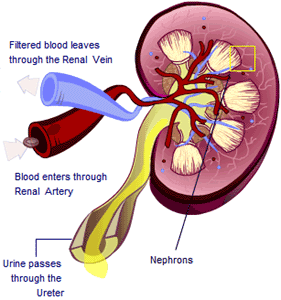1750 9th Avenue | Suite 201 | Port Arthur, TX 77642 | ph (409) 985-6657 | fax (409) 982-7805 |
3395 Plaza 10| Suite A | Beaumont, TX 77702 | ph (409) 899-1117 | fax (409) 899-4440 |
 |
|||||||||||||
| <<<Back |
What does diabetes do to the kidneys?
 With
diabetes, the small blood vessels in the body are injured. When the
blood vessels in the kidneys are injured, your kidneys cannot clean
your blood properly. Your body will retain more water and salt than it
should, which can result in weight gain and ankle swelling. You may
have protein in your urine. Also, waste materials will build up in your
blood.
With
diabetes, the small blood vessels in the body are injured. When the
blood vessels in the kidneys are injured, your kidneys cannot clean
your blood properly. Your body will retain more water and salt than it
should, which can result in weight gain and ankle swelling. You may
have protein in your urine. Also, waste materials will build up in your
blood.
Diabetes also may cause damage to nerves in your body. This can cause difficulty in emptying your bladder. The pressure that results from your full bladder can back up and injure the kidneys. Also, if urine stays in your bladder for a long time, you may get an infection. This is because bacteria grow rapidly in urine that has a high sugar level.
How many diabetic patients will develop kidney disease?
About
30 percent of patients with Type I (juvenile onset) diabetes and 10 to
40 percent of those with Type II (adult onset) diabetes will eventually
have kidney failure.
What are the early signs of kidney disease in patients with diabetes?
The
earliest sign of diabetic kidney disease is an increased excretion of
albumin in the urine. This is present long before the usual tests done
in your doctor's office show evidence of kidney disease. Thus, it is
important for you to have this test on a yearly basis. Weight gain and
ankle swelling may occur. You will use the bathroom more at night. Your
blood pressure may get too high. As a person with diabetes, you should
have your blood, urine and blood pressure checked at least once a year
by your doctor. This will lead to better control of your disease and
early treatment of high blood pressure and kidney disease. Keeping good
control of your diabetes can lower your risk of having severe kidney
disease.
What are the late signs of kidney disease in patients with diabetes?
As
your kidneys fail, you will have a rise in your blood urea nitrogen
(BUN) and creatinine blood tests. You may also have nausea, vomiting, a
loss of appetite, weakness, increasing tiredness, itching, muscle
cramps (especially in your legs) and anemia (a low blood count). You
may find you need to use less insulin. This is because diseased kidneys
cause less breakdown of insulin. If you have any of these signs, call
your doctor.
How are high blood pressure and kidney disease related?
High
blood pressure and kidney disease are closely related. Some kidney
diseases may cause high blood pressure, but more commonly, high blood
pressure may cause kidney disease. The working units of the kidneys
(called nephrons) are damaged after years of stress from the high
pressure. Kidney disease caused by high blood pressure is a leading
cause of kidney failure in the United States. If high blood pressure is
controlled, however, your chances of developing kidney disease and
other complications can be reduced.
 What is blood pressure?
What is blood pressure?
Blood pressure is the force of your blood pushing against the walls of
your arteries. This pressure moves blood from the heart to organs like
the brain, kidneys and the gut.
What is high blood pressure?
High blood pressure (also known as hypertension) occurs when the force
of blood against your artery walls increases. For adults, blood
pressures that stay at 140/90 or more are considered high. A diagnosis
of high blood pressure is not made on the basis of one high reading,
but must be confirmed on follow-up visits to your doctor or clinic.
High blood pressure should be watched by your doctor.
How often should I have my blood pressure checked?
Your blood pressure should be checked at least once a year. If your
blood pressure is too high, you should have it checked as often as your
doctor advises.
What causes high blood pressure?
The causes of high blood pressure are not known in many cases. However,
some people may have a greater likelihood of developing high blood
pressure. These include:
• older people
• people who have a family history of high blood pressure
• African Americans
• people who are overweight
• people who use a lot of salt in their food
• women who use oral contraceptives (the pill)
• people who have diabetes
• people who use "street" drugs
Men are also more likely to develop high blood pressure than women
How is high blood pressure treated?
Although high blood pressure cannot be cured, it can be controlled. If
you have high blood pressure, your doctor may ask you to make some of
the following lifestyle changes:
• lose weight
• exercise more
• cut down on salt
• cut back on alcohol
If these steps do not control your blood pressure well enough, your doctor may order medicines for you. Sometimes, more than one medicine may be needed to get your blood pressure under control. If you are a smoker, your doctor will advise you to quit. Smoking increases your risk of complications such as heart attacks and strokes.